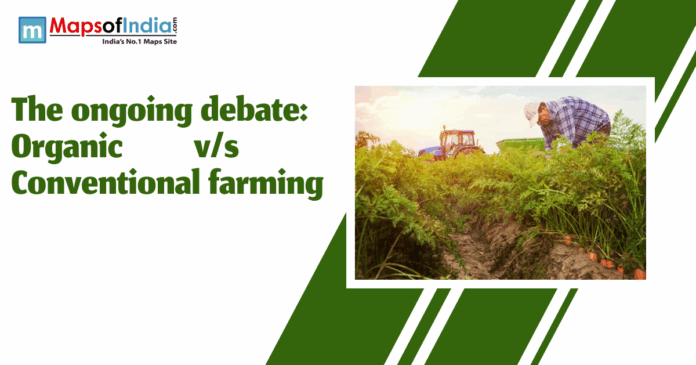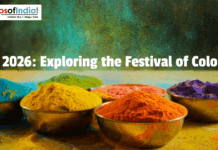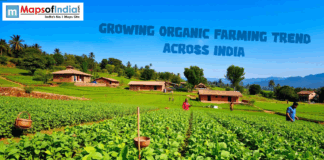Farming is at the heart and core which is necessary for human survival. Through farming, billions of people are being fed, and farming is sustaining the economy of various countries across the world. But at the same time, the most pressing question in agriculture today is which of the organic or conventional farming methods offers the better path forward in farming. Both of these farming techniques have advantages and, at the same time, various challenges. The debate around this topic continues as societies weigh health, environment, cost, and sustainability.
Defining Organic Farming
In Organic farming, farmers avoid using synthetic fertilisers, pesticides, and genetically modified organisms while farming. In organic farming, farmers mostly rely on natural methods of farming such as composting, crop rotation, and biological pest control. The philosophy around organic farming is to maintain harmony between farming the land and nature. The foundation of organic farming is mainly focused on soil fertility, biodiversity, and ecological balance. Farmers who follow organic standards of farming are often certified through strict regulations.
Defining Conventional Farming
Conventional farming is the dominant system across the world. This way of farming, farmers mostly use chemical fertilisers, pesticides, high-yield hybrid seeds, and advanced technologies to farm. The focus of these farming techniques is mostly on efficiency, volume, and this maximises the productivity per acre. The conventional farming method has been central in feeding large populations, especially since this way of farming became popular during the Green Revolution.
Productivity and Yield
The strong argument presented by farmers who prepare the way of conventional farming is that through this method, farmers can deliver high yields. With the use of chemicals and genetically modified seeds, the farmers who do conventional farming often produce more food per hectare than organic farmers. This makes conventional farming a solution that can meet global food demand. On the other hand, organic farming delivers lower yields, mainly in the short term. However, those who advocate organic farming say that organic farming can catch up over time as soil fertility improves.
Impact on Soil Health
The nourishment and health of the Soil a crucial things in agriculture. This good quality of soil can guarantee long-term success in farming. By practising organic farming, farmers can enhance the soil structure and fertility of soil by using compost, manure, and cover crops. The absence of harsh chemicals in the soil will allow various kinds of microorganisms to thrive in the soil. The conventional method of farming is good for producing crops, but at the same time can degrade soil over time. The heavy and more frequent use of synthetic fertilisers in the soil can reduce organic matter and disrupt the microbial biodiversity of the soil. In some areas, using the method of monocropping under conventional systems has led to soil erosion and declining fertility of soil fertility.
Environmental Effects
The people who are more environmentally friendly mostly support the method of Organic farming. Using these farming methods can reduce the chemical waste generated in rivers and lakes. This can be harmful to aquatic ecosystems. The use of these can also encourage biodiversity on farms, from insects to birds. But at the same time, the conventional way of farming has been linked to pollution, greenhouse gas emissions, and loss of biodiversity. The use of pesticides on farms can harm pollinators such as bees, which are essential for crops. But at the same time, those who support the method of conventional farming argue that higher yields per acre reduce the need to clear new land, indirectly protecting forests.
Human Health Concerns
A major point of these debates is about food safety and health. The food that is generated through organic means of farming can contain fewer pesticide residues, which is a key reason consumers choose it. The way of conventional farming, on the other hand, makes food more affordable and widely available to everyone. For consumers, the way of making a choice finally comes down to budget, availability, and perception of risk.
Economic Factors
The cost of farming is an important factor for both farmers and consumers. The method of organic farming most of the time needs more labour and has higher production costs. Certification which are needed adds another layer of expense to it. Because of these things, organic products are more expensive in markets than synthetically produced ones. The method of conventional farming gets various kinds of benefits from economies of scale and lower production costs of the products, which translates to affordable prices for consumers. But at the same time, critics argue that the method of conventional farming does not take into consideration hidden costs such as environmental damage and public health risks.
Technology and Innovation
The conventional ways of farming are now various, adapting new technologies at a rapid pace. From genetically modified crops, the innovation is a success. These crops can resist pests through precision farming using drones and sensors. Use of these tools can help to increase efficiency and reduce waste generated during farming. The method of organic farming, while less reliant on high-tech inputs, is also evolving over time. Various research is happening in the field of organic pest control, natural fertilisers, and agroecology are helping farmers to improve yields and resilience. Both systems continue to adapt as science and demand are evolving over time.
Climate Change Considerations
While farming, taking into consideration climate change is important. The method of organic farming is always considered as a more sustainable way of farming due to lower chemical use and better carbon sequestration in healthy soils. On the other hand, the conventional way of farming has its own advantage of large-scale output to feed growing populations. This method relies on fossil-fuel-based inputs. But at the same time, it adds to greenhouse gas emissions. The debate from the beginning revolves around whether sustainability should prioritise ecological health or feeding demand at scale.
Can the Two Systems Coexist
The debate about which one is better often shows organic and conventional methods of farming methods as opposite sides. But in reality, there is potential for integration. Farmers can practice farming methods from both sides. You can look into it, like integrated pest management reduces chemical use without using fully organic methods. Hybrid models of farming combine the efficiency needed in conventional methods with the ecological benefits that can be obtained from organic farming. Using this middle path of farming may give us the solutions that were needed to feed the world while protecting our planet.





